palmerluckey
Latest
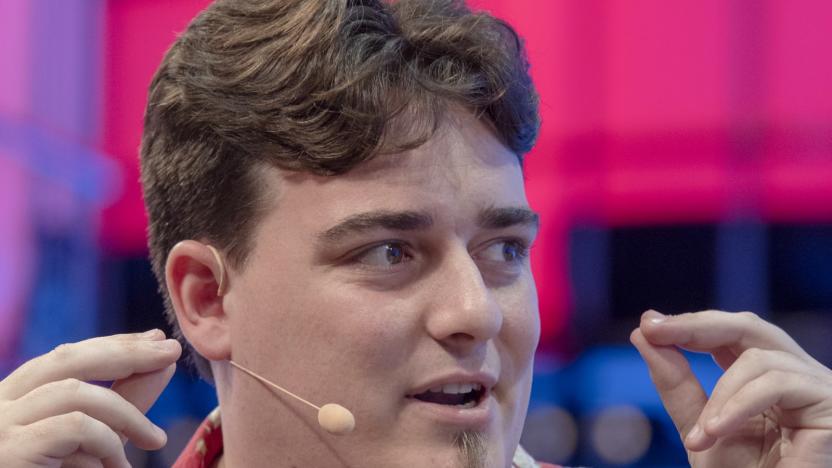
Palmer Luckey's firm wins Pentagon drone AI contract
Google may have backed out of the US military's Project Maven, but that doesn't mean other tech companies are unwilling to participate. The Intercept has learned that Oculus Rift co-founder Palmer Luckey's defense company, Anduril, won a contract to support the drone AI initiative in 2018. The firm will also support the Joint Artificial Intelligence Center, according to newly obtained documents. While there aren't specifics around what that contract would entail, Project Maven relies on machine learning to detect people in drone videos and provide more effective intelligence data.
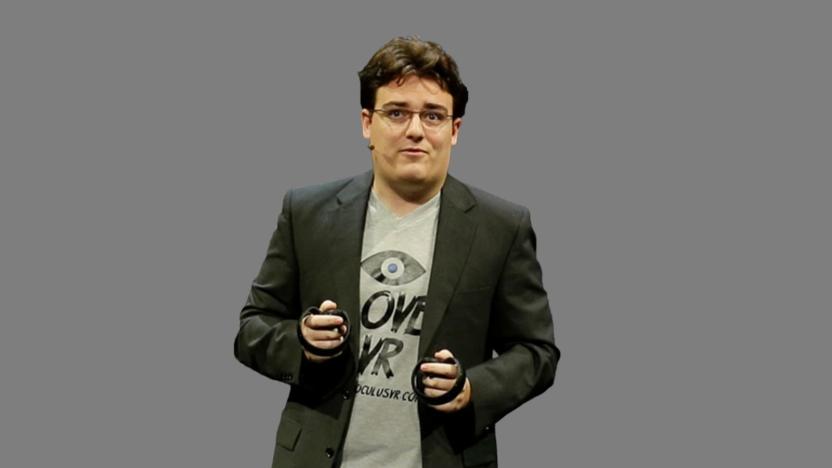
Facebook reportedly pressured Palmer Luckey to support a politician
When Oculus co-founder Palmer Luckey left Facebook, neither said exactly why. The implication that it was due to his quiet donation to a group spreading pro-Trump memes. Now, however, we might have a better idea -- and it raises questions about Facebook's behavior as much as it does Luckey's. The Wall Street Journal has obtained emails and sources indicating that Facebook executives, including Mark Zuckerberg, pressured Luckey to publicly support libertarian presidential candidate Gary Johnson after word of the donation got out. Moreover, Luckey's exit wasn't voluntary. The company placed him on leave and eventually fired him, albeit with an exit package worth "at least" $100 million.

Oculus founder calls Magic Leap headset a 'tragic heap'
Palmer Luckey, the founder of Oculus VR, apparently isn't a fan of the Magic Leap mixed reality headset. The Oculus Rift designer posted a scathing review of the headset to his blog today; the post was called "Magic Leap is a tragic heap." The CEO of Magic Leap, Rony Abovitz, then subtweeted the review, calling its author "bitter," "angry" and "banished.
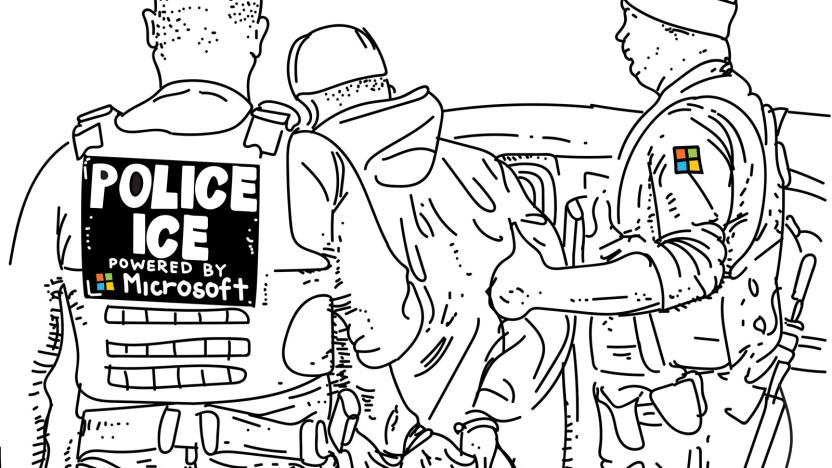
Microsoft’s ICE involvement illustrates tech’s denial problem
Nearly a decade ago, I had the good fortune of being one of the last people to interview the founder of Commodore International, Jack Tramiel (famous for Commodore computers and the popular C64), before he passed away. At 83, he died from heart failure after pioneering the consumer market for personal computers and home gaming, and working toward changing people's lives for the better through technology.
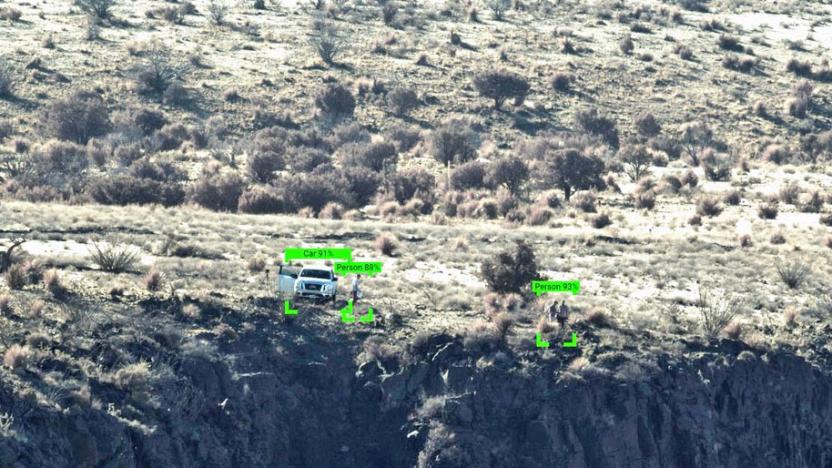
Palmer Luckey chases government contracts with 'virtual wall'
When you hear talk of a border wall, you typically picture an actual, physical construction. But that's not the case for Palmer Luckey. The Oculus co-founder and his startup Anduril Industries have been working on a virtual wall -- one complete with cameras, sensors and VR -- with the aim of scoring a US defense contract and providing border security at a fraction of the cost of a physical wall. Luckey discussed plans for this technology last year, but now it's being tested, both officially and unofficially, and it's catching the eye of US officials.
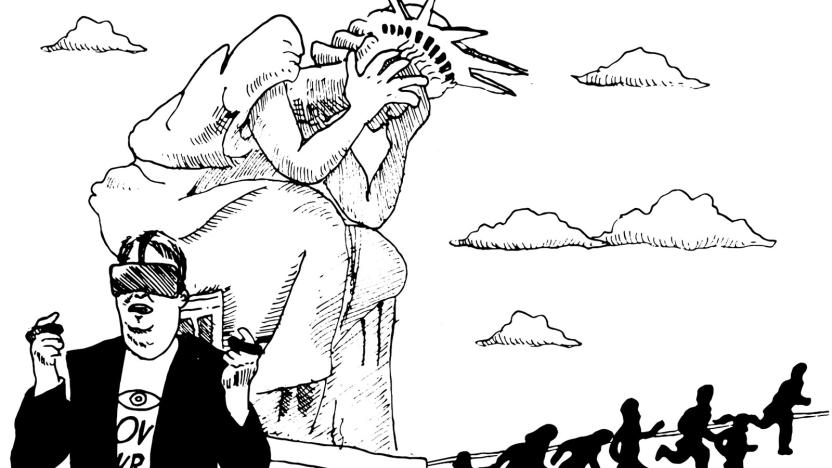
Palmer Luckey's virtual border wall: From disruption to dystopia
"Disruption" was one of Silicon Valley's worst buzzwords. But it was the battle cry of the greedy and desperate of coding and grifting. It meant better and faster data harvesting, venture capitalists throwing money at anything convenient to the wealthy. It meant companies skirting regulations, human rights -- and labor laws were defensible heroes.
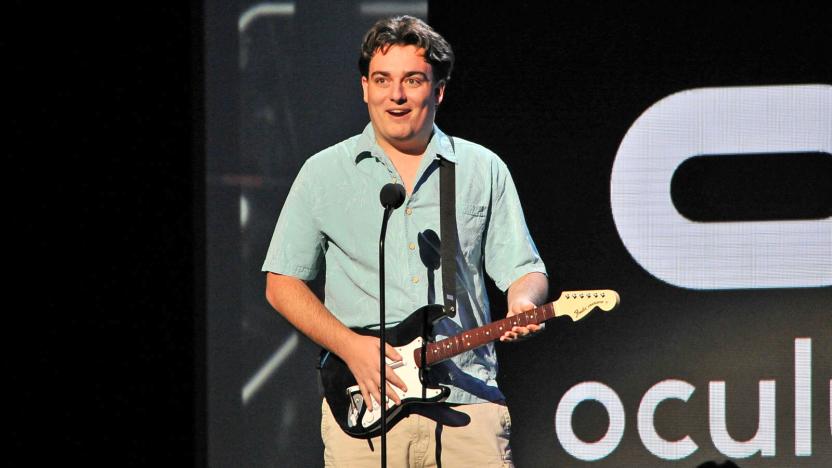
Palmer Luckey wants to develop a ‘virtual’ border wall
Palmer Luckey, co-founder of Oculus, has revealed that he is working on a new startup that will develop virtual border wall technology. Luckey confirmed as much to The New York Times, which reported that he is in the early stages of building a platform that would automatically watch borders. The system would use a combination of infra-red sensors and LIDAR, the same light-detection gear found in most autonomous cars. The idea would be to use the technology to secure military installations, buildings and in place of a physical border wall.
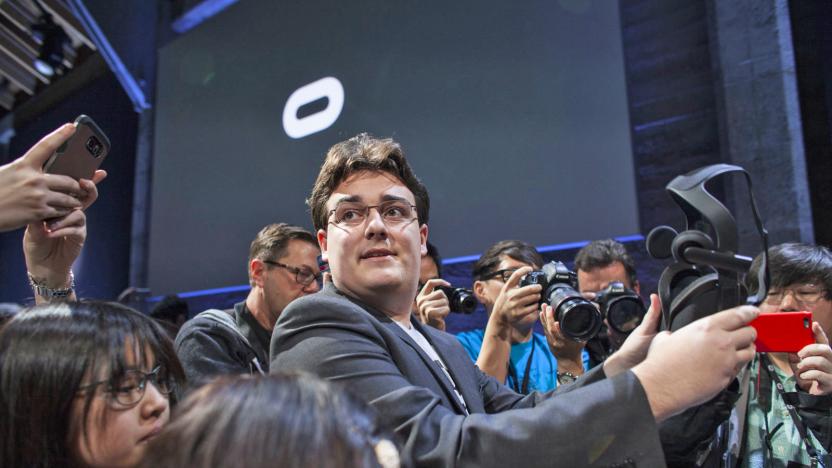
Oculus co-founder Palmer Luckey leaves Facebook
Palmer Luckey, co-founder of Oculus VR and creator of the Rift headset, is no longer with the company. Following the news that he'd donated $10,000 to a group spreading pro-Trump memes, the 24-year old had increasingly shied away from the public eye. That even went as far as skipping last October's Oculus Connect event so as not to be a "distraction" to the news coming out of the conference.

Judge dismisses lawsuit accusing Oculus of using confidential info
While Oculus is still tied up in legal wrangling (in more than one direction) with Zenimax, a California judge just dismissed a different lawsuit against the company. Total Recall Technologies sued the Facebook subsidiary in 2015, claiming that Palmer Luckey violated a confidentiality agreement he'd signed when the company was working with him to develop a VR headset in 2010. The two parties eventually stopped communicating, and later Luckey crowdfunded development of the Oculus Rift, which TRT claimed used info covered by its agreement.
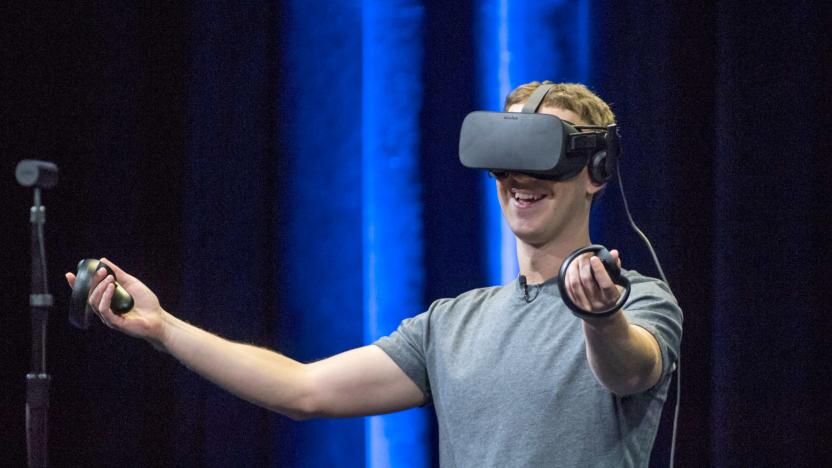
ZeniMax now wants $4 billion from Oculus as case goes to jury
VR pioneer Oculus has been on trial for several weeks now, defending itself against claims it stole crucial code from ZeniMax. But the ultimate judgement is now in the hands of a jury. As reported by Polygon, closing arguments have concluded and the jury now has to decided if Oculus chief technology officer John Carmack stole ZeniMax IP and brought it to Oculus when he joined the company in 2013. At the same time as it wrapped up closing arguments, ZeniMax doubled the damages it is asking for. The company now wants a grand total of $4 billion -- $2 billion in compensation and $2 billion in punitive damages.
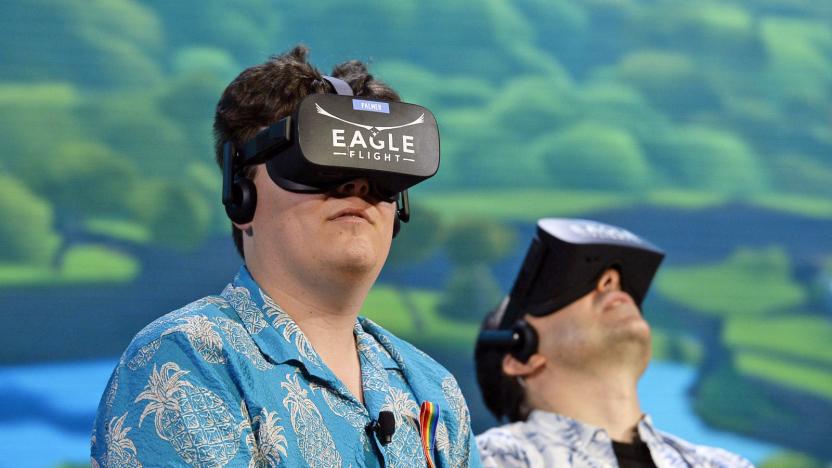
Palmer Luckey insists he didn't steal VR code for Oculus
Yesterday, Facebook CEO Mark Zuckerberg took the stand to testify in a lawsuit against Oculus, and today it was Palmer Luckey's turn. The founder of Oculus VR -- who has remained out of sight since his role in funding political trolls came to light -- sold his startup to Facebook for $2 billion in 2014, but ZeniMax (parent company of iD Software) claims its tech is based on code Oculus CTO John Carmack wrote while still an employee. According to Bloomberg, Luckey testified that while the company's software ran in a demonstration for investors, he also said "I didn't take confidential code...I ran it and demonstrated it through the headset. It is not true I took the code."

Mark Zuckerberg defends Oculus in court against VR rival
Facebook founder Mark Zuckerberg was grilled in court this morning over the creation of the Oculus Rift VR headset, as part of a $2 billion lawsuit brought by ZeniMax Media. ZeniMax -- the owner of Bethesda Softworks, id Software and other video game studios -- says Oculus chief technology officer John Carmack stole ZeniMax's intellectual property when he left the company in 2013. Essentially, ZeniMax argues that it owns the technological foundation behind the Oculus Rift VR headset. Zuckerberg purchased Oculus in 2014 in a deal estimated to be worth $2.3 billion -- and as he made clear on the stand this morning, he disagrees entirely with ZeniMax's claims.
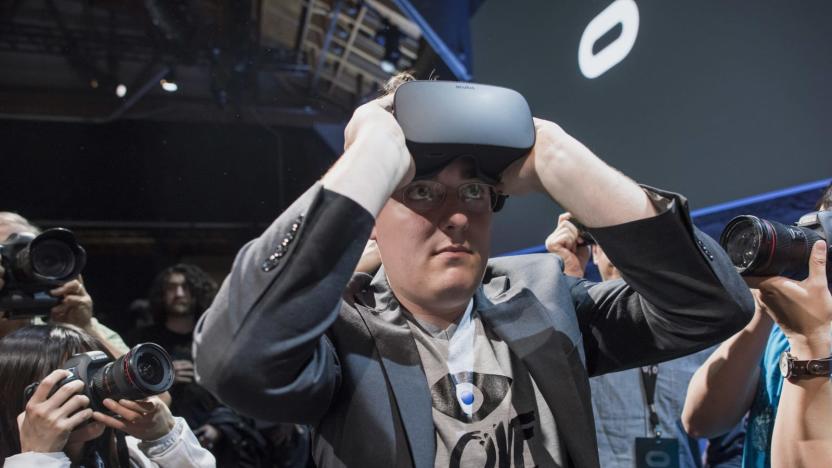
Palmer Luckey skipped the Oculus event to avoid being a 'distraction'
Palmer Luckey may have founded Oculus, but he stayed away from today's big Oculus Connect event after stirring up some trouble recently. Late last month, it was discovered that Luckey donated $10,000 to an anti-Hillary Clinton group that wanted to take some garbage Reddit-style harassment memes and get them into the mainstream via billboards and other prominent messages (something it has failed to do thus far). He apologized, but plenty of developers and Oculus supporters took exception to his actions. Oculus confirmed today that he "chose note to attend" the event to avoid being a "distraction."

Why is the Oculus founder trying to bring hateful memes offline?
Online abuse and bullying have existed as long as the internet has, but it's gone mainstream in a big way over the past few years. Perhaps not coincidentally, we've also spent the past year-plus subjected to Donald Trump's presidential campaign, an outing built on lies, harassment, intimidation and a whole host of other behavior not befitting a candidate for the country's highest office. These two trends collided late last week when it was revealed that Oculus VR founder and Facebook employee Palmer Luckey donated $10,000 to a pro-Trump group called Nimble America. The group's stated purpose is to prove that "shitposting is powerful and meme magic is real." Thus far, there's no evidence that Nimble America has been able to do anything aside from put up one insulting but fairly mild anti-Hillary Clinton billboard outside of Pittsburgh. Despite the group's lack of impact thus far, the fact that Luckey found Nimble America worth supporting shows just how widespread trolling has become.

Oculus founder responds to 'Nimble America' political controversy
Last night The Daily Beast reported that Oculus founder Palmer Luckey is the "NimbleRichMan" behind a group of Donald Trump supporters pushing anti-Hillary Clinton memes, and now Luckey has responded. In a Facebook post claiming recent news stories don't accurately reflect his views (and light on references to either shitposting or meme magic), the 24-year-old claimed his support of the Nimble America group consisted of a $10,000 donation because he "thought the organization had fresh ideas," and that he did not write the posts credited to the pseudonym or delete the account.
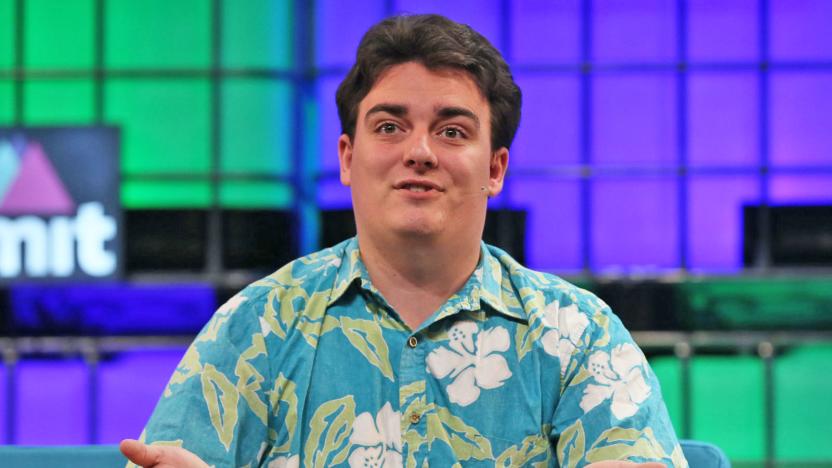
Oculus founder Palmer Luckey secretly funds pro-Trump 'meme magic'
Just in case you were wondering what Palmer Luckey does with all that Facebook money, a The Daily Beast article reveals what he's been up to lately. The outlet says Luckey confirmed he is behind the Reddit pseudonym "NimbleRichMan," providing financial backing to an organization claiming it's proven that "shitposting is powerful and meme magic is real." The Reddit profile has been deleted, but the group's original announcement is archived here.
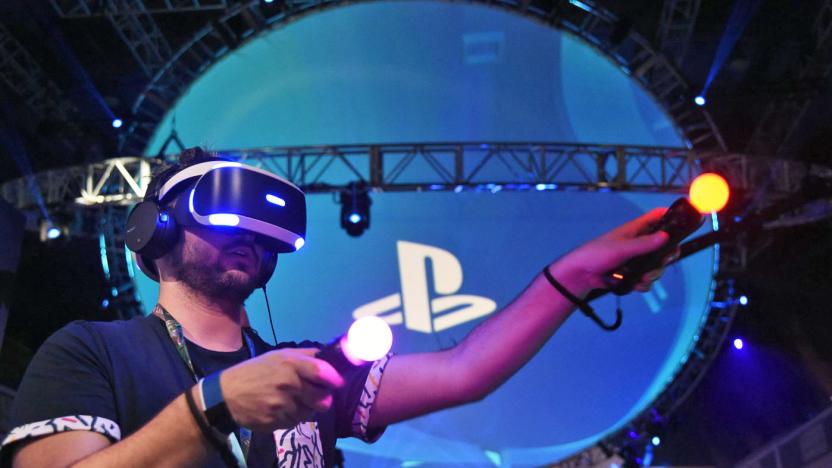
E3 was secretly terrible for the future of virtual reality
After years of being teased with prototypes, developer kits and tech demos, it's finally happening: Virtual reality is on the cusp of going mainstream. Need evidence? Just look at the events of E3 2016. Over the past week, the first VR headset for a home console got a release date, and we caught a glimpse of virtual reality games from popular franchises like Star Wars, Final Fantasy and Batman. Better still, pretty much every major player in the industry (save for Nintendo) promised to support VR in 2017. On the surface, things are looking amazing. Dig a little deeper, though, and the situation just might be terrible.

Oculus founder flew to Alaska to deliver the first consumer Rift
Palmer Luckey, founder of Oculus, took it upon himself to deliver the first consumer version of his company's virtual reality headset, the Rift. Ross Martin, a VR enthusiast and indie developer from Anchorage, Alaska was the lucky recipient of the device, which will arrive on other customers' doorsteps starting tomorrow. Martin, who documented part of his experience with Luckey on Twitter, is the first person to have the device in hand and he'll likely never forget this moment. "So grateful to Palmer Luckey and Oculus for coming all the way to Alaska," he said in a tweet. "You guys are super cool!"

Oculus founder on Rift, 'Eve: Valkyrie' and VR's next steps
Bundled along with every Oculus Rift kit is a copy of Eve: Valkyrie, a multiplayer dogfighting shooter. So as soon as you take the headset out of the box, you'll be able to strap it on and jump right into an epic space battle (after going through a bit of setup, of course). "There'll be very few people who buy the rift and don't at least try it,' said Palmer Luckey, Oculus co-founder and CEO, at a journalist roundtable at GDC 2016. We had a chance to play a session of the game with Luckey as well as CCP Games CEO Hilmar Veigar Pétursson, and talked to them about the Rift, motion sickness, those Touch controllers and where VR is going moving forward.

Palmer Luckey on why there's no Oculus Rift for Mac
Oculus founder Palmer Luckey had some harsh words for Apple products when he spoke to ShackNews at a recent Xbox event. When asked whether the company's forthcoming Rift VR headset will ever be compatible with the MacOS, Luckey stated, "That is up to Apple. If they ever release a good computer, we will do it."












